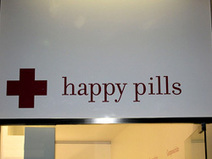Apple iOS 6: Enhancements to Improve Native Apps for Pharma
11/10/2012GlaxoSmithKline to reveal more drug secrets
11/10/2012Big Data In Healthcare: Yes!! | The Big Data Hub
The potential big data holds for transforming healthcare is even greater than other industries or sectors, but perhaps I’m biased. The industry faces daily headlines that raise issues of quality, costs and fraud. Election year or not, these issues are front page news and have been for more than one presidential term.
As citizens, who are also healthcare consumers, we demand that these issues be addressed. Irrespective of political parties, I think we all acknowledge that the status quo in healthcare is NOT acceptable. Here are a few examples of what big data can do:
Collaborative care—Collaboration in healthcare is more than people working together to treat patients. It is about connecting care delivery channels so that evidence-based insights and clinical knowledge can be coupled with patient-specific information to personalize care. Achieving this level of insight requires organizations to do a better job of aggregating trusted patient data and applying specialized knowledge to improve decision making, care delivery and health outcomes.
Personalized medicine—Today, it’s trial and error, with the associated time delays and costs, that many times dictates the best treatment regimen for a given patient and condition. With volumes of data available and analytics to decipher new insights, genomes of a patient can be considered in the context of clinical conditions. Precision in treatment will lead to better outcomes and eliminate cost associated with trial and error.
Fraud—Big data will allow private and public sector organization to integrate the variety and volume of data that is needed to systemically identify and eliminate fraud. With this knowledge in hand, then policies and practices can be changed, preventive measures executed, and costs decreased.
Research—With big data, researchers will have the capability to integrate and analyze data from numerous sources such as genetics, climate, clinical care, and pharmaceutical, just to name a few options. Researchers will be able to effectively analyze this data en masse, as computational limitations will no longer apply. The net will be time is saved, thus costs are decreased and new therapies, drugs, and best practices can be more rapidly established and disseminated.
Best practices—Defining best practices and removing the variability in care is limited by the nature of unstructured data. Big data will allow organizations to combined structured and unstructured data in analytic initiatives. And, big data can consume streaming data that is generated from monitoring and sensing devices, pedometers, glucometers, and social media, just to mention a few potential sources. All sectors of the healthcare industry have potential to tap into these key capabilities and define better, more cost effective care.
See on www.ibmbigdatahub.com




